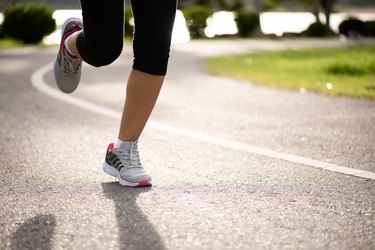
One of the benefits of exercise is that over time, your blood pressure may become lower. However, if your heart rate goes up and your blood pressure drops during an exercise session, this is a sign of a problem.
Numerous issues, including nutritional deficiencies and health conditions, may cause this situation. Consult a doctor for an accurate diagnosis concerning your heart rate and blood pressure relationship.
Video of the Day
Video of the Day
Tip
Having your blood pressure gradually decrease as a result of regular exercise is normal. It's when your blood pressure goes down and pulse goes up that you should have it checked out.
Dehydration and Blood Pressure
When you sweat excessively during exercise, or exercise in hot weather, you raise your risk for dehydration. Not replenishing fluids during your workout further increases risk. Low blood pressure and a rapid heart rate are signs of dehydration. Blood pressure that drops when you stand up is another sign, notes MedlinePlus. Other symptoms include a dry or sticky mouth, lack of energy, dark yellow urine or lack of urine.
If your dehydration is mild, drinking fluids will alleviate the problem. Drink small amounts frequently rather than chugging a large amount, as this can lead to vomiting. If your dehydration is moderate to severe, you may need medical attention, including hospitalization and intravenous fluids. If you are lightheaded, dizzy, lethargic or confused, seek emergency medical attention. Severe dehydration, left untreated, can lead to permanent brain damage, seizures or death.
Complications From Diabetes
Diabetic ketoacidosis can lead to a rapid and thready pulse along with a blood pressure drop as you exercise. This condition is a complication of diabetes. It happens when your body cannot use glucose for fuel because your body has an insufficient amount of insulin. Glucose is the primary fuel your body uses during exercise. When there's not enough insulin in your body, it turns to fat for fuel in lieu of glucose.
When this happens, ketones, the byproducts of fat breakdown, may build up in your body. At high levels, these are poisonous.
Diabetic ketoacidosis also may lead to nausea and vomiting, stomach pain, a fruity breath odor, deep and rapid breathing, fatigue, thirst, decreased appetite, headaches, muscle aches or stiffness, dehydration and its associated symptoms, and a decreased level of consciousness, according to the Mayo Clinic. In extreme cases, it can lead to mental stupor that becomes a diabetic coma.
Allergic Reactions When Exercising
An allergic reaction, such as to a bee sting while you are out running, can cause a sudden fall in blood pressure, coupled with a rapid pulse. The reaction may be to a food you ate prior to your workout session as well. Lowered blood pressure and a quickened pulse are signs of anaphylaxis, which can cause life-threatening symptoms, says Harvard Health Publishing.
Dizziness, lightheadedness, constricted or tightened airways, a swollen throat or a feeling like there's a lump in your throat that makes breathing difficult are other signs. Seek immediate medical attention if you experience this condition. Help to reduce risk by not eating for two hours prior to exercising and avoiding foods that trigger reactions.
Read more: How Does Blood Pressure Change During Exercise?
Poor Nutrition and Anemia
Poor nutrition can cause anemia, which in turn can cause a rapid heart rate and low blood pressure. When you do not take in enough iron, your body lacks what it needs to form adequate red blood cells. Lack of folate and vitamin B12 also can lead to low blood pressure due to anemia. Anemia also is characterized by fatigue.
When you are anemic and not producing enough red blood cells, your body's ability to carry oxygen to tissues like muscle throughout your body is diminished. Other symptoms may include fatigue, lightheadedness, shortness of breath during exercise, concentration problems, headaches, chest pain, tingling and constipation, according to the American Society of Hematology. Consult a doctor if you have signs of anemia.